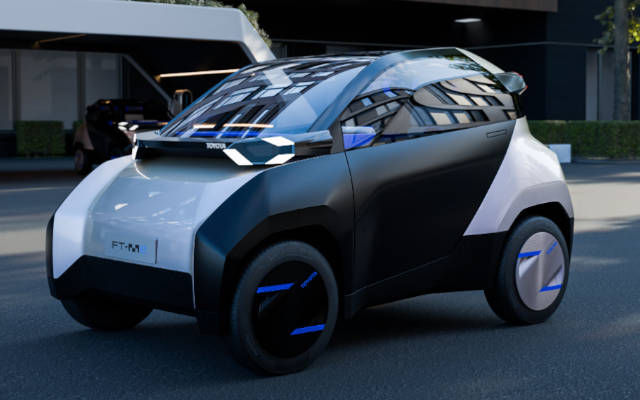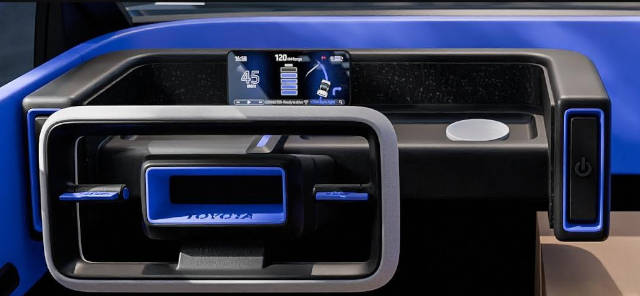Toyota FT-Me: Shared Mobility Concept with Big Implications

Toyota FT-Me concept micromobility EV
By EVWorld.com Si Editorial Team
When Toyota unveiled its FT-Me concept, some headlines described it as a 'car for teenagers.' But a closer look at its design, development partners, and intended use suggests something much more ambitious: a pilot mobility platform built around shared use, accessibility, and sustainability, rather than just a low-speed starter car.
A Concept Built for Shared Use
The FT-Me - short for Future Toyota Micro EV - is a lightweight, two-seat electric vehicle proposed under the L6e quadricycle classification, with a top speed of about 45 km/h. Reports suggest modest battery size and range (estimated ~60–80 km), plus a lightweight body and solar roof to extend daily range.
A major clue to its intended role comes from the funding model: Toyota Manufacturing UK leads a consortium that has secured £15 million in grant funding from the UK Government, via the DRIVE35 programme and the Advanced Propulsion Centre (APC), to conduct a feasibility study. Toyota is expected to match that amount, making the project roughly £30.3 million in total.
The study will be conducted at Toyota's Burnaston facility, with outcomes tested at the University of Derby. The consortium includes partners like Savcor (for solar roof design), ELM Mobility, and academics who will examine user experience, sustainable materials, and component commonality with lightweight last-mile vehicles.

Accessibility, Autonomy, and Controls
One of the standout features is the 'Neo Steer' system: a hand-only control interface that removes foot pedals and places steering, acceleration, and braking in a single unit. Initially intended to enhance accessibility, this layout also reduces complexity for fleet operations and aligns with steer-by-wire technology, which may in future enable driver-assist or limited autonomous functions in controlled urban environments.
Toyota has not confirmed full autonomy for the FT-Me, but its low speed, limited range, and planned usage in shared or urban contexts make it a plausible candidate for Level 2-3 driver assistance (automated parking, collision warning, lane-keeping) rather than full self-driving at launch.
Lessons from the UK's Shared Mobility Market
Shared mobility (car clubs, community pods) is already well established in the UK through operators like Enterprise Car Club, Zipcar, Co-Wheels, and smaller regional providers. Typically, users pay annual membership fees plus hourly or daily rates, with insurance, maintenance, and sometimes charging or fuel included. Hourly fees for small shared EVs or micro-vehicles often range from £5 to £10, with mileage fees around £0.20-£0.30 per mile. Memberships tend to be modest (e.g. ~£10/year) to attract casual use.
These services offer cost savings compared to private car ownership. Studies suggest households can save £1,500-£2,000/year by using car clubs rather than owning a small private vehicle. Shared EV fleets do face higher costs from infrastructure, energy, insurance, and regulatory overheads. Some analyses put the additional cost of operating an EV car club vehicle at £6,000/year over a comparable petrol vehicle.
Hypothetical Cost-of-Use Model: FT-Me in a Shared Fleet
| Parameter | Estimate | Notes |
|---|---|---|
| Purchase / lease cost | ~£12,000/unit | Low-volume, lightweight BEV |
| Battery pack size | ~8 kWh | Sufficient for urban range (~60?80 km) |
| Electricity cost | £0.25/kWh | UK public charging |
| Energy cost per 10 km trip | ~£0.02 | ~0.8 kWh/10 km |
| Insurance & maintenance | ~£800/year | Equivalent to small vehicle class |
| Utilization | ~6 hours/day | Reflective of high-use shared fleet |
| Hourly rental rate | ~£5.50 | Competitive with existing models |
| Annual gross revenue | ~£12,000 | At above utilization rate |
| Payback period | ~1 year | Excluding overheads, admin, depreciation |
Such a model becomes viable if utilization is steady, charging infrastructure is efficient, and regulatory incentives support shared EV deployment.
Shared Mobility, Decarbonization, and Urban Transport
Vehicles like FT-Me have potential to reduce urban emissions, congestion, and parking demand. Shared fleets reduce the number of vehicles needed, while short-trip, low-speed EVs powered partially by solar (roof panels) reduce both tailpipe and upstream emissions.
In last-mile/first-mile scenarios, or for local errands and community vehicle access, these micro-EVs may provide a clean, affordable, and accessible alternative. With public support, well-designed shared mobility pilots, and favourable regulation (zones, low-speed limits, parking/charging incentives), FT-Me could move from concept to fixture in UK mobility networks.
Original Backlink
Views: 398
Articles featured here are generated by supervised Synthetic Intelligence (AKA "Artificial Intelligence").
